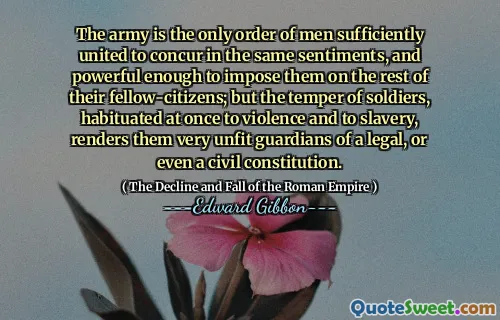"The Decline and Fall of the Roman Empire" by Edward Gibbon is a historical work that traces the trajectory of Roman civilization from its height to its eventual collapse. Gibbon meticulously analyzes the political, military, and cultural factors that contributed to the empire's decline, arguing that internal strife and moral decay played significant roles. His narrative covers the period from the height of the empire to the fall of Constantinople, encompassing centuries of history and numerous challenges faced by the empire.
Gibbon's work is notable for its engaging prose and critical approach to historical sources. He emphasizes the importance of reason and enlightenment thinking, contrasting the decline of Rome with the rise of Christianity, which he viewed as both a unifying and divisive force. The book reflects on how various societal changes, including economic troubles and barbarian invasions, led to a fractured Roman state unable to maintain its former glory.
Ultimately, Gibbon presents a cautionary tale about the dangers of complacency and moral weakness in governance. His analysis not only sheds light on the specifics of Roman history but also offers timeless lessons on the resilience and fragility of societies. "The Decline and Fall of the Roman Empire" remains influential in historical scholarship and serves as a foundational text for those studying the complexities of empire and civilization.
More »
Today Birthdays
1729 -
Edmund Burke
1949 -
Haruki Murakami
1954 -
Howard Stern
1876 -
Jack London
1993 -
Zayn Malik
1951 -
Kirstie Alley
1863 -
Swami Vivekananda
1923 -
Alice Miller
1987 -
Naya Rivera
1825 -
Brooke Foss Westcott
1944 -
Joe Frazier
1951 -
Rush Limbaugh
1964 -
Jeff Bezos
1978 -
Jeremy Camp
1628 -
Charles Perrault
1856 -
John Singer Sargent
1970 -
Kaja Foglio
1953 -
Rick Santelli
1986 -
Gemma Arterton
1968 -
Raf Simons
1958 -
Christiane Amanpour
1966 -
Olivier Martinez
1996 -
Ella Henderson
1917 -
Maharishi Mahesh Yogi
1949 -
Ottmar Hitzfeld
1928 -
Ruth Brown
1968 -
Heather Mills
1946 -
George Duke
1968 -
Rachael Harris
1923 -
Ira Hayes
